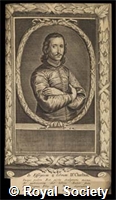| Authorised form of name | Charleton; Walter (1620 - 1707); physician and natural philosopher |
| Other forms of name | Charlton, Walter |
| Other forms of surname | Charlton |
| Dates | 1620 - 1707 |
| Nationality | British |
| Place of birth | Parsonage House, Shepton Mallett, Somerset, England, Europe |
| Date of birth | 2 February 1620 |
| Place of death | London, England, Europe |
| Date of death | 24 April 1707 |
| Occupation | Physician |
| Research field | Natural philosophy |
| Medicine |
| Chemistry |
| Activity | Education:
Educated by his father; Magdalen Hall, Oxford (matriculated 1635; MD 1643)
Career:
Physician-in-ordinary to Charles I and Charles II; occasional assistant to senior Royal Physician Sir Theodore Turquet de Mayerne; practised in London (1650-1691); published 'A Ternary of Paradoxes', 'Deliramenta catarrhi', and 'Spiritus gorgonicus' (1650); published his work 'Physiologia Epicuro-Gassendo-Charltoniana; or, A fabrick of science natural upon the hypothesis of atoms, founded by Epicurus, repaired by Petrus Gassendus, augmented by Walter Charleton' (1654); appointed physician-in-ordinary to exiled Charles II; Harveian orator (1680; 1705); retired to Nantwich, Cheshire (1692); returned to London and was appointed College of Physician's Harveian librarian (1706)
Memberships:
Royal College of Physicians (Honorary Fellow 1664; Fellow 1676-1677; President 1689-1691)
|
| Membership category | Original Fellow |
| Date of election | 20/05/1663 |
| RSActivity | Committee and panels:
Anatomical Committee (1664); Committee for Collecting all the Phenomena of Nature hitherto observed (1664) |
| Other Royal Society activity | Proposed on 23 January 1661; Involved in thermal and poison-related experiments and observations (1661); Interested in echoes and sonic phenomena, in particular in relation to the whispering gallery at Gloucester Cathedral (1662); Wrote a paper on the fulmination of Gold and on the velocity of sounds (1662) |
| Relationships | Parents: Walter Charlton and Susannah Jeay
Married: 1) Ann Parsons; 2) Dorothy Waterman |
| PublishedWorks | RCN: 32804
RCN: 32803
RCN: R82295
RCN: 32805
RCN: 33687 |
| OtherInfo | Charleton's work was influenced by the theory of iatrochemistry, a branch of chemistry and medicine with its roots in alchemy. His translation work of Van Helmont's work further painted him as a representative of this field. For these views, he faced criticicsm from more orthodox colleagues. He was further introduced to mechanical philosophy through association with Sir Kenelm Digby (FRS 1663) and Thomas Hobbes. Charleton's most important work remains his 'Physiologia', which exceeded the aims of a mere translation of Gassendi's 'Syntagma Philosophiae Epicuri' (a revival of Epicurean natural philosophy), and in which Charleton included his own viewpoints, reconstructing a world system on the basis of hard atoms in motion in the void. He was set on defending Epicurean atomism against its frequent equation with atheism and his work is considered vital in popularising atomic ideas of Epicureanism in England. |
| Related images | Discover a selection of related images in our picture library |
| Image | 
|
| Source | Sources:
Bulloch's Roll; DNB; DSB; Munk's Roll; Foster; ODNB
References:
Robert Kargon, 'Walter Charleton, Robert Boyle, and the Acceptance of Epicurean Atomism in England', in Isis, 1964, vol 55(2), pp 184-192
Horne, R. A, 'Review of Physiologia. Epicuro-Gassendo-Charltoniana: Or a Fabrick of Science Natural, upon the Hypothesis of Atoms, Founded by Epicurus, Repaired by Petrus Gessendus, Augmented by Walter Charleton, by W. Charleton', in Isis, 1967, vol 58(2), pp 270–271
P M Rattansi, 'The Intellectual Origins of the Royal Society' in NR 1968 vol 23 pp 129-143
Michael Hunter, 'The Social Bias and Changing Fortunes of an Early Scientific Institution: An Analysis of the Membership of the Royal Society, 1660-1685' in NR 1976-7 vol 31 pp 9-114
Penelope M Gouk, 'Acoustics in the Early Royal Society 1660-1680' in NR 1981-82 vol 36 pp 155-175
Notes:
The election date is Charleton's re-election date into the Society after the grant of the second charter in April 1663. All Fellows admitted in a two-month window after this charter, until 22 June 1663, are considered Original Fellows. He was previously admitted into the Society on 15 May 1661.
Name spelt 'Charleton' in DNB, DSB and by Michael Hunter. Alternative birth and death dates (13 Feb, 6 May) provided by DSB. Birth date given as 1619 in Munk. |
| Virtual International Authority File | http://viaf.org/viaf/24689876 |
| Code | NA8167 |
| RefNo | Title | Date |
| RBO/2i/6 | How to preserve birds with a powder by Dr Charlton | nd |
| CLP/4i/3 | Paper, 'Observation of the force of lightning on a boy of 14 years of age, who was therewith struck dead, in the field near Nantwich in Cheshire [England]' by W [Walter] Charleton | [1662] |
| DM/5/72 | 'Desiderata recommended to Dr Charleton' | c.1663 |
| CLP/4i/10 | Paper, 'Certain experiments concerning freezing of snow, not unworthy exact tryal' by Dr [Walter] Charleton | 1663 |
| CLP/11i/2 | Paper, 'Pulvis condiendis avium cadavinbus utilissimus' by Dr Charlton [Walter Charleton] | [1662] |
| CLP/2/35 | Paper, 'Apparatus phono-campticus or what enquiries are principally to be made by such, who would attend to the certain knowledge of the nature of eccho's' by Walter Charleton | [1662] |
| CLP/16/18 | Paper, 'The plant of the admirable stone antiquity, at Avebury, near Marlborough, Wiltshire [England]' by Dr [Walter] Charleton | 8 July 1663 |